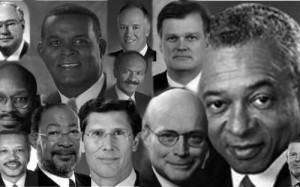
The “teddy bear effect” is something I’ve touched on before in this blog and is now, more than ever, the topic of exigency. The slayings of Trayvon Martin, Eric Garner, Michael Brown, and Tamir Rice, among many others whose names are yet fully known bring to mind the work of one of this year’s MacArthur Genius Award winners: Jennifer Eberhardt’s “Deathworthy” study about how the dark skin and African looking facial characteristics of black defendants are highly correlated to the likelihood of their being sentenced to the death penalty.
The spontaneous memorials, such as the one pictured above, have popped up at sites where police (or wannabe cops) have murdered unarmed, often adolescent black males all speak to teddy bears as a visual and spatial phenomenon of race. Alongside the realities uncovered in the Deathworthy study, is another study by Robert Livingston. Coined the “teddy bear effect,” researchers demonstrated how and why our society can enact the “postracial” iteration of Jim Crow in the form of mass incarceration and all these brutal police killings directly alongside the amazing success of the Barack Obama presidency.
It seems, according to the evidence, that successful African American leadership —beyond impressive credentials, competence, and diligence — is accompanied by certain “disarming mechanisms” such as physical and behavioral traits that attenuate perceptions of black threat held by the dominant culture. It appears that some black men have developed an extraordinary psychological capacity to affect the feelings of comfort engendered by persceptions of cuteness in order to assuage white racial anxieties about black men’s purported criminality. Among these disarming mechanisms is that of “babyfaceness,” which some African American men physically possess (and may intentionally play up) because they realize how whites experience their “cuteness” as helpful in reducing the perception of black aggression. White experiences of fear or intimidation may actually be a cultural form of subconscious projection due to the realistic threat suffered by blacks because whites’ possess such inordinately higher levels of social power vis-à-vis their black counterparts in most cases.

Deathworthiness versus babyfaceness serves as empirical evidence of the quantifiably predictable quality of “cuteness” as a racial construct that too often means life or death for our black brothers, partners, and sons. It’s interesting that both studies, particularly in the case of Livingston, make clever nods towards the heavily anthologized Brent Staples essay, “Just Walk on By: Black Men and Public Space,” in which the essayist refers to his habit of coping with whites’ perception of black male threat as a “tension-reducing” tactic meant to assuage white fears and and offer a sense of racial comfort in the public sphere. The kicker comes when Staples admits how “warbling bright, sunny selections from Vivaldi’s Four Seasons is the equivalent of the cowbell that hikers wear when they know they are in bear country” and speaks most eloquently to the strange dilemma of masculine empowerment and racial entrapment experienced by black men when moving through public space.
Teddy bears in bear country, sadly, is the perfect trope for the beastly outcomes derived from the unchecked racist policies and legal processes of white American culture and jurisprudence. #BlackLivesMatter


Leave a comment